Environmental Education, our main goal
Conservation
The oceans cover 71% of our planet’s surface. They are important because they influence the atmosphere’s chemical and physical processes, regulating climate and the cycling of elements like carbon, oxygen and phosphorus, among others. They also provide us with food and thus have acquired an economic, social and cultural importance.
At present, the marine ecosystems (coral reefs, mangroves, coastal dunes and deep sea) are being altered and affected by different processes, caused mainly by the over-exploitation of resources and the impact generated by human activities.
At the Interactive Aquarium Cancun, we teach our visitors about marine conservation and five of the main threats to these ecosystems. You can learn more about them here and about the actions we can take to mitigate their effect.
- Overfishing
- Save energy to save our oceans
- Invasion of exotic species
- Solid waste pollution
- Delphinus Environmental Education Program
- Overfishing
- Overfishing
- Save energy to save our oceans
- Invasion of exotic species
- Solid waste pollution
- Delphinus Environmental Education Program
What is overfishing?
Overfishing occurs when fish are caught at a faster rate than they can replenish through natural reproduction. Among the consequences of overfishing are the extinction of species and the disruption of the food chain.
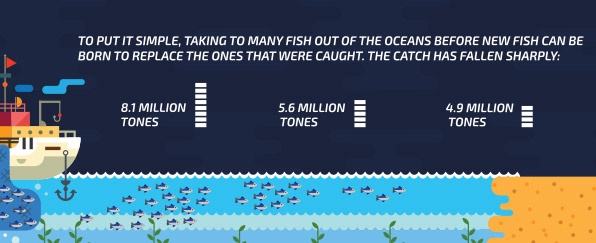
If this continues, our seas and oceans will soon be seriously threatened, not only in terms of their ecological relationships, but also as our resources for food.
Preserve marine species
The population of certain species such as cod, tuna and swordfish has decreased by 90%, mainly due to overfishing. This means that if we wish to continue enjoying the nutrients we get from fish and seafood, we must give these species time to restore their population. By alternating and respecting closed seasons, we will preserve the marine ecosystem and ensure the that the resources provided to us will last.
Buy local and sustainable food
Aquaculture is the sustainable cultivation of fish, mollusks, crustaceans and aquatic plants. This practice helps increase the production of seafood for human consumption, restore threatened species and protect them from predators.
When you consume or buy fish and seafood, opt for local production; look for suppliers whose products come from aquaculture, who promote responsible fishing and protect species, the ecosystem and biodiversity.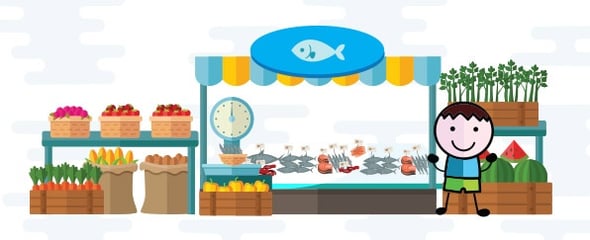
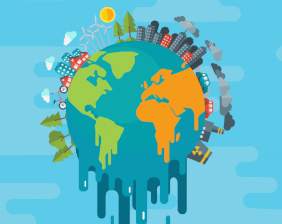 Climate change
Climate change
It is the alteration in the composition of the global atmosphere, directly or indirectly attributed to human activity and which adds to the natural variability of climate.
What human activities cause the increase of gases in the atmosphere?
- The burning of fossil fuels like oil, gas, coal (main sources of carbon dioxide CO2 emissions) and deforestation for agriculture and urbanization coupled with the production of lime to make cement.
- The widespread use of natural gas (main source of methane CH4 emissions), artificial agricultural fertilizers and the burning of solid waste (main source of nitrous oxide N20 emissions).
- The components of extinguishers, computer parts and electrical equipment (main sources of hydrofluorocarbons (NEC) and perfluorocarbons (PFCs) emissions).
The consequences of climate change are reflected in:
- Rising sea levels.
- Changes in the pattern and amount of rainfall.
- More frequent extreme weather including droughts, heat waves, hurricanes and torrential rains.
- Very strong changes in crop yields.
Save energy to save our oceans
Did you know that to obtain electrical energy, we depend on the combustion of non-renewable resources which generate greenhouse gases when combusted? That’s right, electrical energy is essential for everyday life but very few know about its impact on the environment.
While it is true that we must demand more sustainable alternatives such as wind and solar energy, it is also true that we must take joint responsibility for the negative impact on the environment. The adoption of simple measures such as using energy-saving bulbs and unplugging electronics that are not being used, helps reduce emissions of carbon dioxide.

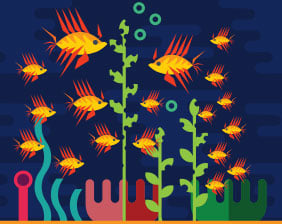 Invasion of exotic species
Invasion of exotic species
Invasive species are those that are found outside of their natural location, able to compete with native organisms, alter the habitat, reduce biodiversity and even cause the extinction of native plant and animal species.
An example of an exotic invasive species is the lionfish, a native of the Indo Pacific region. Its presence on the Coast of the Mexican Caribbean was first reported in 2009. It is a poisonous fish, it reproduces easily and is so aggressive when looking for food that it can destroy up to 90% of a reef. The only predator that can help restore the balance is man, through its consumption.
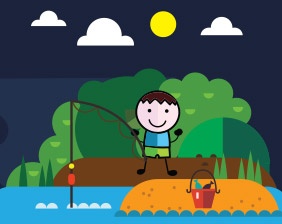 Solid waste pollution
Solid waste pollution
It refers to the direct or indirect introduction of materials (plastics, metals, papers, etc.) in coastal and marine environments, harming natural resources, the quality of the water, ecological interactions and even human health.
This problem occurs in all cities, at different scales, and is linked to the chain management of solid waste, including the processes of collection, minimization, recycling, transport and disposal.
Two consequences of solid waste pollution are ingestion and the death of animals that confuse these materials with food or get tangled up in the waste.
What can we do?
- Practice the rule of the 3 R's (Reduce, Reuse and Recycle).
- Choose reusable objects and use less disposables.
- Do not throw trash on the street or on the beach.
- Pick up the trash you find on the beach or on the street and place it in a suitable container.
- Separate your residues in at least two categories (organic and inorganic).
- Consume responsibly.
- Join a cleaning crew and motivate others to join.
Delphinus Environmental Education Program
Thanks to all our visitors, we are able to invest 10% of our profits in social and environmental projects.
For a brilliant blue planet
- 7,084 volunteers for beach cleaning
- 107,690 participants in school visits
- 14 theses on Veterinary Academic Consulting
- 20,227 kg. of waste collected from beach cleanups
Beach cleaning program
Since 2013, Delphinus has been committed to cleaning the coast of Quintana Roo. Over the past 10 years, we have organized 44 beach cleanups, recollecting a total of 20,227 kg of waste, thanks to the participation of 7,084 volunteers. The beach cleanups are essentially educational and encourage the active participation of the local population in the conservation of the oceans through activities of environmental service.
Didactic visits program
Our alliance for the environmental education of Quintana Roo:
- Delphinus
- Xcaret y Xel-há
- Flora, Fauna and Culture of Mexico
- The Ministry of Education and Culture of Quintana Roo
Together we have established this alliance to benefit more than 96 thousand students and 10 thousand teachers throughout the school year.
Our Delphinus Environmental Education Program includes training in values and commitment to environmental protection by the internal community, their promotion in Quintana Roo’s elementary schools and among visitors or consumers who enjoy our facilities and dolphin interaction programs.
Our activities for the conservation of the environment:
- Environment education classes in high school
- Beach cleaning
- Recycling of solid waste
For the welfare of our dolphins
Our marine mammals are the heart of our organization, which is why we have the responsibility to direct all our efforts towards their welfare. We have developed the Animal Welfare Program that complies with the specific necessities and characteristics of our dolphins, sea lions and the habitats in which they evolve.
This program starts with the elaboration of a healthy and balanced diet specific to each sea mammal, taking into account its calorie and nutritional intake and characteristics such as age, sex, stage of development and reproductive condition.
Our veterinary medicine model is based, first and foremost, on the prevention of illnesses. Every day, before opening the doors to visitors, our specialists in animal care follow a revision protocol to detect any physical or behavioral changes in our dolphins. We also carry out regular blood tests, analyses of stomach contents, mycoses and other infections in order to identify health changes at an early stage.
